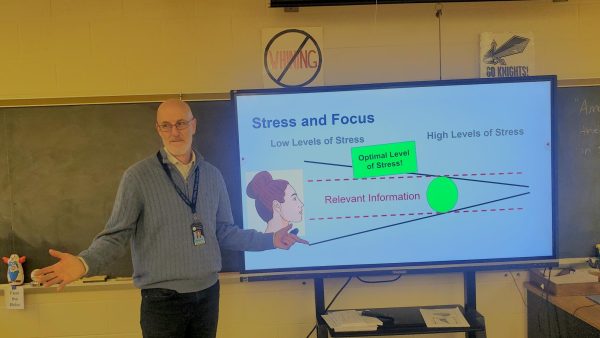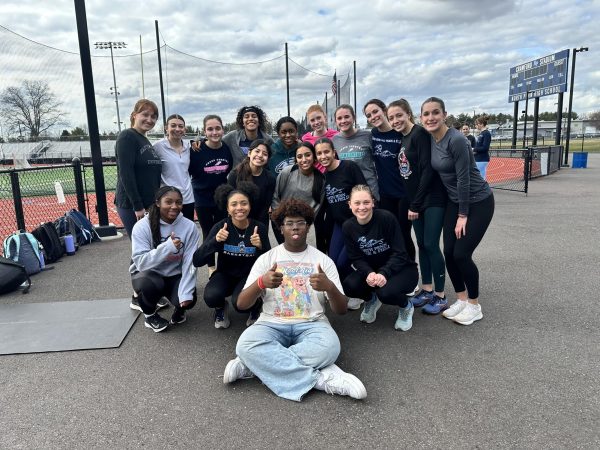Teenage balancing act
When it comes to school, work, and extracurriculars, the key is balance

FILE PHOTO: Students make their way to classes during passing time earlier this school year at North Penn High School.
October 1, 2015
As if rolling out of bed before the sun rises and coming to school to work for six hours and then most likely returning with homework isn’t already time constraining enough, balancing work and other extracurricular activities along with school can be a difficult task for even the most organized, time-savvy individuals.
A key factor in keeping oneself above the quicksand that is school, is to find a balance between the various activities that you partake in so you can manage your time well.
Nearly eighty percent of U.S. students in high school or college work at least nineteen hours a week during the school year; according to Market Watch’s Quentin Fottrell. For some that means getting home from school and heading right to work until 10:00 or 10:30 PM. Then by the time they get home, they have to choose between struggling to keep their eyes open to finish the homework due tomorrow, or getting some much needed rest before having to be up again by six in the morning to repeat this long tiresome day.
“It’s tough because at the end of the day you’re so physically and mentally drained from giving 110% at school and [then] working late, but you still have to find time to squeeze in your homework for the next day,” said NPHS student Jenna Cohen who works at, and dances, at a local studio.
Just to exacerbate this problem, according to the National Institute of General Medical Sciences, adolescents usually find it hard to fall asleep early due to the shifts in their circadian rhythm.
“Getting sleep and somehow keeping up with homework [is] basically impossible,” said Doug Pett, a student, part-time worker and a part of the NP baseball team.
The circadian rhythm refers to the internal body clock of a person that regulates the body temperature, hormonal changes, sleep-wake cycles, and appetite. Having a body “hardwired” to stay up until midnight or later and then being forced to wake up by the alarm clock’s ringing roll call at five or six am does not give teenagers enough sleep to function at school and whatever else they have planned throughout the day.
Many students often prioritize personal factors, including work and social life above schoolwork, which can lead to a decline in academic performance and stress.
Stress can be a good thing because it keeps students focused and aware of all the things that need to be done. It can motivate you to study harder and complete assignments and projects on time. But when your stress level becomes more than a motivating tool, or when pressures are too intense, you may be in a stress overload.
So how does a tired, time-consumed, technology-distracted teen tackle this time management dilemma?
1. Time Management
Time Management is a key component to academic and professional success. It is an essential skill that will help students concentrate their efforts on what is most important in your everyday life. Prioritize your time to be social and to work, but make sure you ration time wisely to complete the schoolwork assigned to you. A simple way to do this is try to get done as many school assignments as you can before you have to work, because nobody wants to be doing them at nine or ten after work.
2. Strive to be a high achiever not a perfectionist.
Perfectionism refers to a set of self-defeating thoughts and behaviors aimed at reaching unrealistically high goals. It is based on perceived standards of excellence and often fueled by the need for others’ approval. So don’t be so hard on yourself for not getting a perfect grade because this could affect the way you perform throughout the day and you don’t want school to affect work, or vice versa. You just have to put it behind you and focus on preparing for the next task.
3. Learn to say ‘no.’
This is not the time to volunteer to run new initiatives at work or assume new family responsibilities. Just meeting your requirements at work, school, and home will be enough of a challenge for now. Remember it is only temporary and you don’t want to get caught up in more than you can handle during this already jam-packed high school experience.
In this fast paced 21st century, where we are always moving and have something to get done, put away your phone, create good sleep habits, prioritize your responsibilities and enjoy your life. These stressful crammed days are preparing us to better manage our time in our future.
Sources:
http://www.marketwatch.com/story/nearly-4-out-of-5-students-work-2013-08-07
http://www.nigms.nih.gov/Education/Pages/Factsheet_CircadianRhythms.aspx




















Kristi Bryson • Oct 1, 2015 at 9:04 pm
Excellent advice for a technology driven generation! Good article!
Rita Mora • Oct 1, 2015 at 2:34 pm
Excellent Article and Sooooo very true Ryan Bryson!!